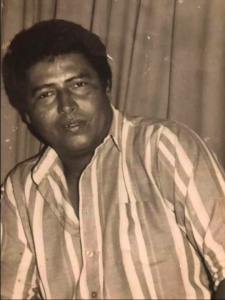CEPAD History – Peace Commissions
Arsenio (left) and Dr. Parajón (right) played major roles in our peace commissions program.
We want to share CEPAD history with you. A large part of our organization started out of emergency relief after the earthquake in 1972 and through times of war in the 1980’s. In order to understand the impact of CEPAD’s work, it is important to understand the situation in Nicaragua revolving around the war.
The Contra War took place in Nicaragua during the 1980’s. The two main parties involved were the FSLN and the Contras. The FSLN (Frente Sandinista de Liberación Nacional – Sandinist Front for National Liberation) was the political party in power at the time. They had taken power in the 1970’s after they overthrew the Somoza regime. The Contras were the groups of rebels mostly made up of Somoza supporters who wanted power in the country once again.
In 1981, President Ronald Raigan cut financial aid to Nicaragua but approved sending arms to the Contras, who had based themselves on the eastern coast. In this way, the Contras became backed by the CIA. As violence continued to grow, the Nicaraguan government imposed a draft for obligatory military service, impacting families across the country.
In 1982, violence grew even more when the Contras began assassinating government officials and planting mines across the eastern coast to prevent any sort of trade or support for the government through the ports.
All other Central American countries were experiencing similar civil wars, and finally in 1987, peace agreements were signed across the region for peaceful reconciliation. It took time to reach peace in Nicaragua, and in 1990, the FSLN lost presidential elections and power was given to an anti-Sanidinista political party.
CEPAD played a large role in bringing peace to Nicaragua, headed by CEPAD’s founder, Dr. Gustavo Parajón. He committed himself to work for peace in 1983 after people in the Nueva Guinea region requested his help. The East Coast became so divided by war that it became clear what side people stood on – brothers against brothers – and there was so much hurt. CEPAD had a good reputation since their start in 1972, and their authority was respected on all sides.
In September of 1983, Nueva Guinea formed their own peace commissions. 120 commissions made up of 5 people each (600 participants in total) worked voluntarily across the region to mediate between armed rebel groups and the government. The goal was to work towards peace and disarm the Contras. In each meeting, Dr. Parajón advocated for a special time of biblical reading and reflection, allowing both sides to grow spiritually and deepen their understanding of peace.
Part of CEPAD’s successful aid is due to the fact that they always maintained they were an impartial group. CEPAD didn’t stand with the government or the Contras; they were working only for peace. They petitioned to the government to allow seminary students and pastors to be exempt from the military draft, and the government approved.
In 1987, once the peace agreements were signed across Central America, Dr. Gustavo Parajón was named to be part of the National Reconciliation Commission by President Daniel Ortega. CEPAD’s peace commission efforts were so highly respected that they were the only ones trusted to perform the disarming ceremonies – not the national army or the OEA (Organización de los Estados de las Americas – Organization of American States). By successfully disarming the rebels, Dr. Parajón’s efforts were even recognized by the U.S. Congress.
Though we no longer have the peace commissions program, we are working towards reconciliation after the crisis of 2018, providing workshops for rural community leaders to assist their neighbors in spite of the current political crisis that began in April of 2018.



